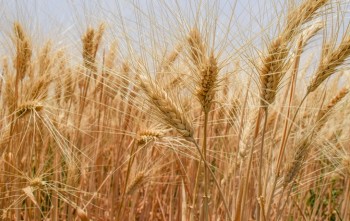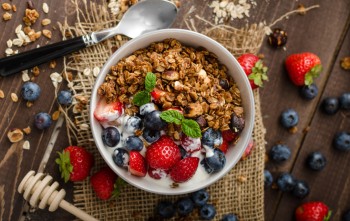15 Healthy and Nutritious Menu Ideas for Your Beloved Family

Caring for the health and happiness of your family can be achieved through special dishes made from delicious and nutrient-rich ingredients. The benefits of healthy and nutritious foods for the body are extensive, ranging from supporting cell growth and muscle maintenance to maintaining a healthy immune system.
The right nutrition helps reduce the risk of chronic diseases, maintains a balanced weight, and boosts daily energy. Explore a variety of healthy and nutritious food options for your beloved family. Discover delicious choices that not only delight the taste buds but also support overall health through the following article.
Understanding Healthy and Nutritious Foods
Healthy and nutritious foods refer to types of food that provide essential nutrients needed by the body to maintain health and optimal function. These foods contain a variety of nutrients such as vitamins, minerals, proteins, carbohydrates, healthy fats, fiber, and water in balanced proportions. Consuming healthy and nutritious foods contributes to growth, development, tissue maintenance, and optimal body function. These foods can also help prevent diseases, maintain a healthy weight, and improve overall energy and well-being.
Benefits of Healthy and Nutritious Foods for the Body
- Adequate nutrition supports physical growth and brain development in children and adolescents.
- Nutritious foods can boost the body's resistance to infections and diseases.
- Nutrition maintains the health of cells, tissues, and organs to function properly.
- Carbohydrates and healthy fats provide the necessary energy for daily activities.
- Healthy foods can help reduce the risk of diseases such as diabetes, heart disease, hypertension, and obesity.
- Healthy foods help maintain an ideal body weight and prevent excessive weight problems.
- Fiber, healthy fats, and specific nutrients like omega-3 support heart health.
- Nutrients such as omega-3 fatty acids and antioxidants contribute to brain health and cognition.
- Calcium, vitamin D, and other nutrients help build and maintain bone density.
- Dietary fiber helps maintain proper digestive function.
- Nutrients like vitamin E, vitamin C, and water help maintain skin health.
- Protein and other nutrients are needed to accelerate the body's recovery after injury.
Ideal Criteria for Healthy and Nutritious Foods
- Foods should contain carbohydrates, protein, healthy fats, vitamins, minerals, and fiber in balanced proportions.
- Avoid processed foods to minimize added sugars, salt, and trans fats.
- High fiber content to support digestion, control blood sugar, and maintain satiety.
- Protein intake from sources such as lean meat, fish, eggs, legumes, and low-fat dairy.
- Healthy fat choices such as unsaturated fats (omega-3 and omega-6) from fish, nuts, and vegetable oils.
- Foods should not contain excessive added sugars that can negatively impact health.
- Rich in vitamins (A, C, D, E, K) and minerals (iron, calcium, magnesium, zinc).
- Fruits, vegetables, legumes, and whole grains for fiber and phytonutrient intake.
- Foods high in trans fats and saturated fats should be avoided.
Types of Foods to Avoid
- Fast food, which is typically high in trans fats, saturated fats, added sugars, and extra salt. Fast food is also often low in fiber and nutrients.
- Processed foods high in sugar, such as candies, cakes, sodas, and other sweet foods that can cause blood sugar spikes.
- Processed foods high in salt, including excessive salt-containing foods like chips, canned foods, and fast food.
- Fried foods, which are cooked in hot oil containing trans fats that can harm heart health.
- Alcoholic beverages, excessive consumption can damage internal organs and lead to long-term health problems.
- Packaged and instant foods containing preservatives, added sugars, and high salt content.
- Processed meats like sausages, ham, and smoked meats that can increase the risk of cardiovascular disease and cancer.
- Energy drinks and sugary beverages that contain high added sugar and stimulant ingredients.
- Trans fat-containing foods like fast food, cookies, and hard margarine.
- High-cholesterol foods like egg yolks and other high-fat foods that can increase blood cholesterol levels.
- Foods with preservatives and chemicals, such as processed foods with additives like coloring, preservatives, and other chemicals.
- High-caffeine foods, consuming too much caffeine can lead to sleep problems and heart disturbances.
- Highly processed refined carbohydrates, such as white bread, white rice, and refined flour products that can cause blood sugar spikes.
- High-lactose foods for those with lactose intolerance, individuals with lactose intolerance should avoid high-lactose dairy products.
- Processed foods with added sugars, like bottled salad dressings, ketchup, and other sauces containing added sugar.
Healthy and Nutritious Food Menu Choices
Granola
Granola is a mixture of foods made from grains like oats, seeds, nuts, and dried fruits, mixed and baked until crispy. Granola is often considered a healthy breakfast or snack food due to its rich nutritional content, especially in terms of fiber, protein, vitamins, and minerals. There's no need to worry; you can enjoy this type of food through YAVA products.
YAVA Granola is an example of healthy and nutritious food that can be a good choice for providing varied nutrition and supporting a healthy lifestyle. If YAVA Granola is produced with high-quality ingredients and without excessive added sugar or preservatives, it can be a good option for breakfast or snacks.
Cashews
Cashews are a good source of unsaturated fats, protein, fiber, vitamins, and minerals such as magnesium and iron. They also contain beneficial antioxidants and phytosterols that are good for heart health and the immune system. YAVA Cashews are an example of a food product that contains cashews and is sold by the YAVA brand. Produced with high-quality ingredients, without excessive added sugar or preservatives, and preserving nutrition in the processing, this product can be a healthy and nutritious choice.
Sorghum
Sorghum is a grain that has various health benefits, including being rich in fiber, vitamins, minerals, and antioxidants. Sorghum is also gluten-free, making it suitable for people with gluten sensitivity or celiac disease. YAVA products like Krispi Puffs that contain sorghum are an example of a healthier snack alternative compared to processed snacks that contain more sugar and saturated fat.
Whole Wheat Bread
Whole wheat bread is generally considered a healthy and nutritious food. Whole wheat bread is made from whole wheat flour or less processed flour compared to regular white flour, so it still contains the bran layer of wheat grains, which is rich in fiber, vitamin B, minerals, and antioxidants. Moreover, the higher fiber content in whole wheat bread helps maintain healthy digestion, regulate blood sugar, and provide a longer-lasting feeling of fullness. Whole wheat bread contains vitamin B complex and iron.
Smoothies
Smoothies can be a healthy and nutritious food in the form of a drink made from a mix of fresh fruits, vegetables, yogurt, milk, or plant-based milk, as well as other additions like grains, protein powder, or even leafy green vegetables rich in vitamins, minerals, and antioxidants derived from fruits and vegetables.
Oats
Oats are a type of grain that is rich in nutrients and has many health benefits. They contain high soluble fiber, which is beneficial for digestion, maintaining satiety, and regulating blood sugar. The carbohydrates in oats are complex, meaning they release energy slowly and steadily, maintaining consistent energy levels. Oats also contain some protein, which can help in muscle recovery and maintaining nutrient balance. Oats contain a variety of vitamins B, iron, magnesium, phosphorus, and manganese.
Animal Protein
Animal protein does have the potential to be part of a healthy and nutritious diet because it is rich in essential amino acids and other important nutrients. Animal protein is usually found in products such as meat, poultry, fish, eggs, milk, and dairy products. Animal protein contains all the essential amino acids needed by the human body in optimal amounts, making it a source of high-quality protein. Other nutrients include iron, zinc, B-complex vitamins (especially vitamin B12), and calcium.
Fruits
Fruits are a prime example of very healthy and nutritious foods. They are rich in vitamins, minerals, fiber, and essential compounds that are important for maintaining overall health. Most fruits are low in fat and calories, making them a good choice for weight management, and they have a low glycemic index.
Vegetables
Vegetables are a classic example of very healthy and nutritious foods, providing essential nutrients that offer various health benefits. They are high in fiber, which is good for digestion, maintaining satiety, and regulating blood sugar. Vegetables are rich in various vitamins (such as vitamin C, vitamin K, and vitamin A), minerals (such as potassium, magnesium, and iron), and phytonutrients that help protect the body's cells from oxidative damage.
Low-Fat Dairy Products
Low-fat dairy products are examples of foods that can be part of a healthy and nutritious diet and are a good source of calcium, which is important for maintaining bone and dental health. Dairy products can also provide protein, which is important for growth, muscle maintenance, and various body functions. These dairy products contain vitamin D and vitamin B12.
Grains
Grains are essential sources of important nutrients that provide various essential nutrients for the body, especially whole grains, which are rich in fiber and are good for digestion, maintaining satiety, and regulating blood sugar. They provide complex carbohydrates that release energy gradually and steadily and protein that is essential for growth, muscle repair, and body function. Grains contain B-complex vitamins, iron, magnesium, and phosphorus.
Legumes
Legumes are a good source of plant-based protein, essential for growth, muscle maintenance, and body function. They are high in fiber, which is good for digestion, maintaining satiety, and regulating blood sugar. Legumes contain unsaturated fats that are beneficial for heart health and other body functions.
Sweet Potatoes
Sweet potatoes are nutrient-rich and have many health benefits. They contain fiber that is good for digestion, maintaining satiety, and regulating blood sugar. Orange sweet potatoes are rich in beta-carotene, which the body converts into vitamin A, essential for eye, skin, and immune system health. Sweet potatoes also contain vitamin C, which acts as an antioxidant, supporting the immune system.
Olive Oil
Olive oil is an example of oil considered healthy and nutritious food. It contains monounsaturated fats, especially oleic acid, known for its heart health benefits, and antioxidants such as polyphenols and vitamin E, which help protect the body's cells from oxidative damage. Compounds in olive oil can have anti-inflammatory effects, helping reduce inflammation in the body.
Garlic
Garlic is an example of a food ingredient considered healthy and has potential health benefits. It contains allicin compounds that offer many health benefits, including potential antimicrobial and anti-inflammatory effects. Some studies suggest that garlic can help regulate blood sugar levels and improve insulin sensitivity.
Ideas for Healthy and Nutritious Indonesian Foods
Here are some ideas for Indonesian dishes that you can prepare using the above-mentioned healthy and nutritious ingredients:
- Tempe Bacem
- Capcay
- Chicken Soup
- Spicy Fried Eggs (Telur Balado)
- Fried Rice Vermicelli (Bihun Goreng)
- Tongseng (Spicy Beef or Mutton Stew)
- Rendang (Beef Stew)
- Rawon (Dark Beef Soup)
- Gulai (Indonesian Curry)
- Pecel (Javanese Salad)
- Pepes Tofu (Steamed Tofu)
- Cah Kangkung (Stir-Fried Water Spinach)
- Spicy Crab (Kepiting Pedas)
Tips for Creating a Balanced Daily Food Menu
Creating a balanced and nutritious daily menu requires careful planning. First, choose a variety of foods from each main food group, including protein sources, whole grains, vegetables, fruits, and low-fat dairy products. Pay attention to portion sizes and color variations, as different colors in food indicate diverse nutrients. Increase the consumption of vegetables and fruits and use healthy sources of both plant-based and animal-based protein. Prioritize complex carbohydrates like whole wheat, brown rice, and potatoes.
Avoid processed foods high in added sugars, salt, and saturated fats. Pay attention to cooking techniques, such as steaming, grilling, or boiling, to preserve nutritional content. Stay hydrated by drinking enough water. Remember that variety and balance are key, and consult with a nutrition expert if needed to ensure that your daily menu meets the necessary nutritional requirements for optimal health.
Conclusion
Healthy and nutritious foods refer to types of food that provide essential nutrients needed by the body to maintain health and optimal function. Healthy and nutritious foods have positive effects on the body in both the short and long term. A balanced and diverse diet will help maximize their benefits.
Some types of foods should be avoided or consumed very sparingly due to their potential negative effects on health. It is important to maintain a healthy diet by avoiding or limiting these types of foods and choosing healthier and more nutritious food options.
Discover healthy and delicious food variants from YAVA at your favorite online store.















